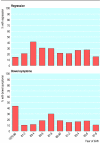Measles, mumps, and rubella vaccination and bowel problems or developmental regression in children with autism: population study
- PMID: 11850369
- PMCID: PMC65532
- DOI: 10.1136/bmj.324.7334.393
Measles, mumps, and rubella vaccination and bowel problems or developmental regression in children with autism: population study
Abstract
Objectives: To investigate whether measles, mumps, and rubella (MMR) vaccination is associated with bowel problems and developmental regression in children with autism, looking for evidence of a "new variant" form of autism.
Design: Population study with case note review linked to independently recorded vaccine data.
Setting: Five health districts in north east London.
Participants: 278 children with core autism and 195 with atypical autism, mainly identified from computerised disability registers and born between 1979 and 1998.
Main outcome measures: Recorded bowel problems lasting at least three months, age of reported regression of the child's development where it was a feature, and relation of these to MMR vaccination.
Results: The proportion of children with developmental regression (25% overall) or bowel symptoms (17%) did not change significantly (P value for trend 0.50 and 0.47, respectively) during the 20 years from 1979, a period which included the introduction of MMR vaccination in October 1988. No significant difference was found in rates of bowel problems or regression in children who received the MMR vaccine before their parents became concerned about their development (where MMR might have caused or triggered the autism with regression or bowel problem), compared with those who received it only after such concern and those who had not received the MMR vaccine. A possible association between non-specific bowel problems and regression in children with autism was seen but this was unrelated to MMR vaccination.
Conclusions: These findings provide no support for an MMR associated "new variant" form of autism with developmental regression and bowel problems, and further evidence against involvement of MMR vaccine in the initiation of autism.
Figures
Comment in
-
MMR and autistic enterocolitis: consistent epidemiological failure to find an association.Mol Psychiatry. 2003 Feb;8(2):133-4. doi: 10.1038/sj.mp.4001266. Mol Psychiatry. 2003. PMID: 12610643 Review. No abstract available.
References
-
- Wakefield AJ, Murch SH, Anthony A, Linnell J, Casson DM, Malik M, et al. Ileal-lymphoid-nodular hyperplasia, non-specific colitis, and pervasive developmental disorder in children. Lancet. 1998;351:637–641. - PubMed
-
- Taylor B, Miller E, Farrington CP, Petropoulos M-C, Favot-Mayaud I, Li J, et al. Autism and measles, mump and rubella vaccine: no epidemiological evidence for a causal association. Lancet. 1999;353:2026–2029. - PubMed
-
- Farrington CP, Miller E, Taylor B. MMR and autism: further evidence against a causal association. Vaccine. 2001;19:3632–3635. - PubMed
-
- Dales L, Hammer S, Smith N. Time trends in autism and MMR immunisation in California. JAMA. 2001;285:1183–1185. - PubMed
Publication types
MeSH terms
Substances
LinkOut - more resources
Full Text Sources
Medical
Molecular Biology Databases

